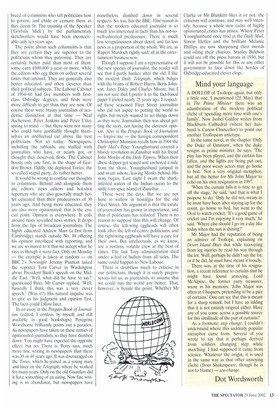Mind your language
A DOLLOP of Trollope again, but only a little one. I mentioned (25 May) that in The Prime Minister there was an adumbration of the modern political cliché of 'spending more time with one's family'. Now Isobel Galilee writes from Blackburn Cathedral (where her husband is Canon Chancellor) to point out another Trollopean antetype.
In the same novel, in the chapter 'Only the Duke of Omnium', when the duke resigns as prime minister, he says, 'The
play has been played, and the curtain has fallen, and the lights are being put out,
and the poor weary actors may go home to bed.' Not a very original metaphor, but all the better for Mr John Major to echo on his own resignation in 1997.
'When the curtain falls it is time to get off the stage,' he said, 'and that is what propose to do.' Only he did not, weary as he must have been after staying up for the
count, go home to bed, but went to the Oval to watch cricket. 'It's a good game of cricket and I'm enjoying it very much,' he said. 'Where else should I go on a day like today when the sun is shining?'
Mr Major had the reputation of being an admirer of Trollope, explaining on Desert Island Discs that while recovering from leg injuries he read his way through the lot. Well, perhaps he didn't say the lot, or if he did, he must have meant it loosely.
There was, at the time of his resignation, a recent reference to curtains that he might have found annoying. Lord McAlpine, the former party treasurer, wrote in his memoirs: 'John Major was often at Chequers, pretending to be a pair of curtains.' One can see that this is meant for a sharp remark, but I have an inlding that it is not entirely original either. Have any of you come across a possible source for this similitude of the pair of curtains?
As a footnote: step change. I couldn't understand where this suddenly popular metaphor came from. Several of you wrote to say that it perhaps derived from soldiers changing step while marching. I had supposed it came from science. Whatever the origin, it is used in the same way as that other annoying cliché (from Shakespeare, though he is not to blame) — sea-change.
Dot Wordsworth


































































 Previous page
Previous page